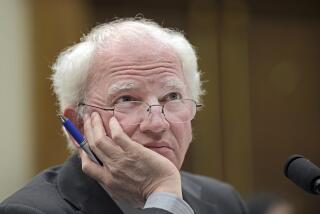High Court Suspends Paraplegic Attorney
- Share via
SAN FRANCISCO — The state Supreme Court on Thursday refused to disbar a paraplegic lawyer who won milestone rulings for the disabled but later faced charges of professional misconduct that threatened his legal career.
The court, rejecting a recommendation by the State Bar of California, instead imposed a two-year suspension from law practice on Mason Rose V of Rolling Hills for what it called “numerous and serious” wrongful acts.
Among other things, the justices found that Rose improperly solicited clients, neglected to serve clients and failed to disclose fully his potential conflict of interest in a business deal with a widowed mother of two he had represented in a lawsuit.
The justices said that while disbarment might otherwise be warranted, other factors favored a milder punishment. They cited Rose’s “demonstrated legal abilities”--including a widely acclaimed decision he won before the state high court in 1979--his dedication to the cause of the disabled and his zeal in accepting legal work for free.
The court noted also that Rose had suffered “unusual stress” from the breakup of his marriage and that a psychiatrist had found aspects of his personality had caused him to “assume more responsibilities than he could competently handle.”
Under the court’s ruling, Rose will be on probation for five years and barred from practicing law for two years. After that two-year period, he may resume his legal career but will remain under the supervision of the State Bar.
Rose’s attorney, David A. Clare of Orange, welcomed the decision even though he had asked the court for no more than a one-year suspension. “I’m happy about it,” he said. “The court took a good, serious look at the case.”
Early 1980s
Clare pointed out that the acts of misconduct occurred mainly in the early 1980s at a time he said Rose was overworked in his zealous advocacy of the disabled and was emotionally drained from a deteriorating first marriage. “He has fully recovered from his emotional problems,” Clare said. “The public is going to be protected from Mr. Rose because Mr. Rose is already rehabilitated, not because he is now being disciplined.”
Diane C. Yu, general counsel for the State Bar, noted that while he was not disbarred, Rose still faced a “severe sanction” in the two-year suspension.
The 52-year-old Rose, a former Marine Corps fighter pilot, was confined to a wheelchair as a result of spinal injuries he received in a helicopter crash in 1965. After attending law school, he launched a formidable career representing the handicapped and serving in state and national groups supporting the disabled.
In 1979, he won a ruling from the state high court that handicapped parents could not be denied custody of their children solely because of disability--a case later dramatized in a movie for television. In 1984, he obtained a federal court decision improving the access of the disabled to postal service facilities.
Meanwhile, Rose also was active in local politics, serving on the City Council of Rolling Hills for eight years--including two years in which he was mayor.
In 1986, however, the Bar accused Rose of a wide range of misconduct--some of which involved clients who themselves were disabled. The charges included failure to communicate with clients and properly handle client funds and records, improper solicitation of a client and improper business dealings with a client. A Bar hearing panel recommended a one-year suspension, but the Bar review department in 1987 urged that he be disbarred--the profession’s most severe penalty and one that ordinarily prevents an attorney from seeking reinstatement for five years.
Rose admitted to some misconduct, blaming the pressure of his work for the handicapped and his broken marriage for his failure to serve clients properly. He denied the most serious charges--including an allegation that he had dealt improperly with the widow of a Navy pilot killed in a helicopter crash.
In that case, the Bar accused Rose of inducing the woman to invest $70,000 she received from a wrongful-death settlement in a since-failed restaurant franchise, without fully disclosing that he would receive 25% of the company’s stock if he obtained her as an investor.
The high court, in an unsigned, 37-page opinion issued Thursday, said that while legal papers the woman signed did cite Rose’s financial involvement, they did not openly reveal his potential conflict of interest. The woman, the court noted, had testified she had read the documents but did not fully understand them. Thus, said the court, Rose had not made the disclosure in a way a client could reasonably understand--a violation of Bar rules for attorneys.
The justices said there was no indication that the transaction was not a legitimate business deal or that Rose did not believe it would help his widowed client.
“Nonetheless, we note that the investment was hardly prudent for a widow with two young children, limited financial resources and virtually no business experience,” the court said. “Although the transaction involved substantial risks, (Rose) did not discuss or emphasize these risks in presenting the proposal to (his client).”
Violated Standards
On another issue in the case, the court found that Rose had violated professional standards in seeking to represent two Marine Corps pilots injured in a 1978 helicopter crash. Rose visited the men in the hospital and had “stepped over the line” into “prohibited direct solicitation,” the court said.
The court also said that Rose had improperly failed to communicate with the two pilots, agreeing to represent them but then filing no suit for four years.
In another matter, the court found Rose neglected to promptly pay a wheelchair-bound client a $10,000 settlement he negotiated for her in a lawsuit over her denial of access to the Los Angeles Music Center in 1982.
More to Read
Sign up for Essential California
The most important California stories and recommendations in your inbox every morning.
You may occasionally receive promotional content from the Los Angeles Times.













